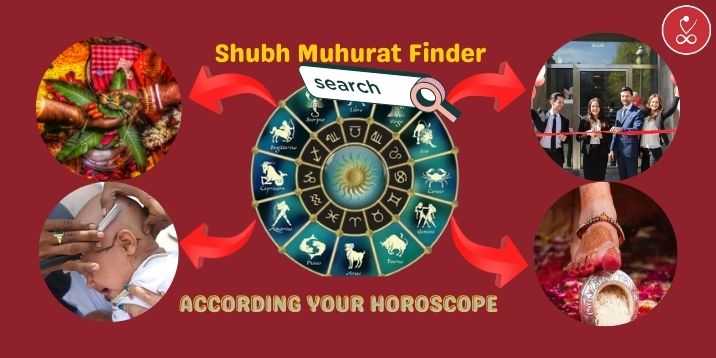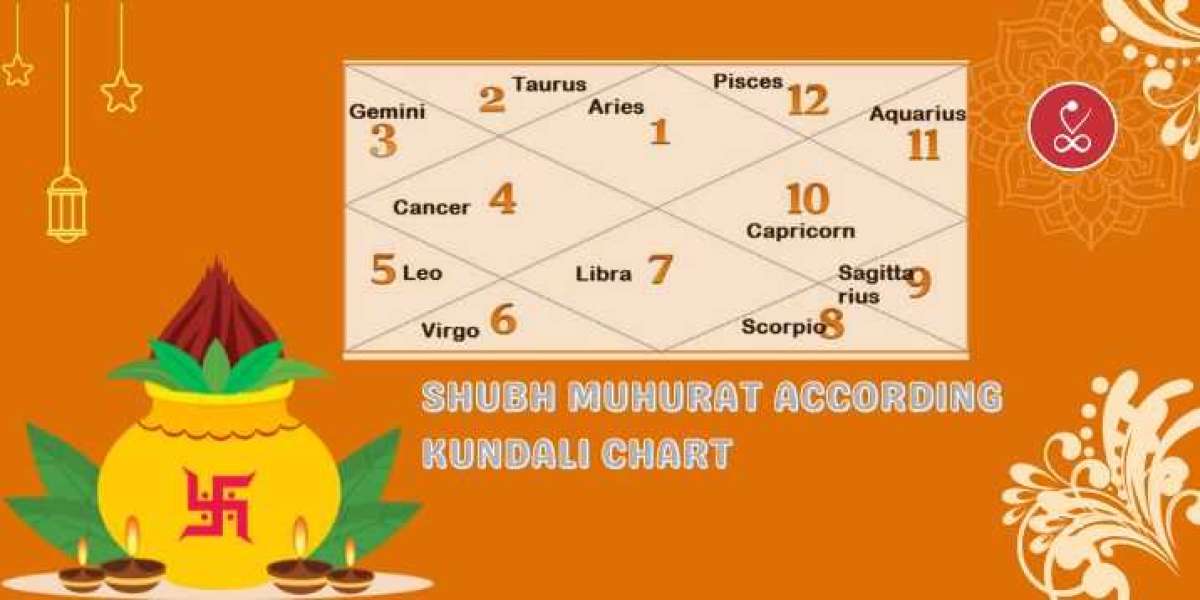What is Muhurat?
A Muhurat (also spelled as "Muhurta") is an auspicious or favourable time period in Hindu astrology for starting significant activities such as weddings, business ventures, housewarming ceremonies, or religious rituals. The belief is that performing important tasks during a Muhurat brings success, prosperity, and positive outcomes.
The Muhurat is calculated by astrologers based on various factors, including the positions of celestial bodies, planetary movements, the lunar calendar (Tithi), and other astrological elements like Nakshatra (constellations), Karana, and Yoga.
Choosing the right Muhurat is an essential part of Hindu tradition, ensuring that significant activities align with cosmic energies believed to influence human life positively.
What is Shubh Muhurat?
Shubh Muhurat refers to an auspicious or favourable time period in Vedic astrology when it is considered highly beneficial to start important activities or events. The word "Shubh" means "auspicious" or "favourable," while "Muhurat" refers to the specific moment or time.
A Shubh Muhurat is calculated based on various astrological factors, such as:
- Planetary positions (Grahas)
- Lunar calendar (Tithi)
- Nakshatra (constellation)
- Yoga and Karana
- Ascendant (Lagna)
By selecting a Shubh Muhurat, one ensures that the cosmic energies are aligned favourably, which is believed to result in success, prosperity, and the smooth completion of the task or event.
Types of Muhurat According to Date of Birth in Vedic Astrology
In Vedic astrology, the date of birth (along with time and place) is critical in determining auspicious Mahurats for various life events. Each individual's astrological chart or horoscope (Janam Kundali) is unique and influences the selection of Muhurats for personal milestones. Based on the date of birth, the following Muhurats are often selected:

1. Vivah Muhurat (Marriage Muhurat)
- Factors: The couple's horoscopes are matched for compatibility using the Ashtakoota system (matching eight key elements) or Dashakoota system. Muhurat is chosen by evaluating favourable planetary positions, especially of the Moon and Venus, as they signify relationships and love.
- Birth Chart Influence: The bride's and groom's Nakshatras (birth star) are considered, and specific Tithis (lunar days) are preferred, avoiding inauspicious periods like Rahu Kaal or Chaturdashi.
2. Griha Pravesh Muhurat (Housewarming Muhurat)
- Factors: Based on the individual's birth chart, especially the position of the 4th house (representing home) and the ruling planet of this house.
- Birth Chart Influence: The Moon's placement on the day of the Griha Pravesh and other planetary positions relative to the individual’s birth chart (Lagna or Ascendant) are examined to avoid inauspicious times.
3. Namkaran Muhurat (Naming Ceremony Muhurat)
- Factors: The Nakshatra of the baby is one of the key determinants. The first letter of the name is usually derived from the Nakshatra in which the child is born.
- Birth Chart Influence: The planetary positions and the moon sign (Rashi) at the time of birth are considered to suggest an auspicious name and day for the ceremony.
4. Annaprashan Muhurat (First Feeding Muhurat)
- Factors: For feeding solid food to a child, specific Nakshatras, weekdays, and Tithis (lunar days) are considered.
- Birth Chart Influence: The 2nd house (associated with food and speech) in the child’s horoscope plays a significant role, and favourable planetary periods (Dasha) are examined for this ritual.
5. Mundan Muhurat (First Haircut Muhurat)
- Factors: The Mundan ceremony is conducted when specific Nakshatras and planetary positions align favourably, especially considering the Moon's position.
- Birth Chart Influence: The individual's Lagna (Ascendant) and Nakshatra at birth are important in selecting the right Muhurat. The 1st house (physical body) and its ruling planet are also considered.
6. Yajnopavita Muhurat (Thread Ceremony Muhurat)
- Factors: The child's birth chart is consulted to ensure the Yajnopavita ceremony occurs during a favourable Dasha (planetary period) and appropriate Nakshatra.
- Birth Chart Influence: The Sun's position in the child’s birth chart is considered, as the Yajnopavita ceremony is related to spiritual initiation and self-discipline, ruled by the Sun.
7. Starting Business Muhurat
- Factors: The Muhurat is chosen by examining the 10th house (career) and the 7th house (partnerships) in the individual's birth chart.
- Birth Chart Influence: Favourable planets like Jupiter (for growth and prosperity) and Mercury (for communication and business) are consulted for starting new ventures.
8. Buying Property or Vehicle Muhurat
- Factors: The birth chart's 4th house (property) and 2nd house (wealth) are considered before purchasing property or a vehicle.
- Birth Chart Influence: Auspicious transits of Venus (for vehicles and luxury) and Mars (for land or property) are important in the selection of the Muhurat.
9. Starting Education Muhurat
- Factors: The 5th house (education and intellect) in the individual's chart is examined for starting new educational pursuits.
- Birth Chart Influence: Favourable planetary influences from Mercury (knowledge), Jupiter (wisdom), and the Moon (mind) are considered for starting education or taking exams.
10. Travel Muhurat
- Factors: The 3rd house (short travel) and 9th house (long journeys) in the birth chart play a crucial role in selecting travel Muhurats.
- Birth Chart Influence: Favourable transits of the Moon and Jupiter (for safe and prosperous travel) are considered, along with avoiding periods like Rahu Kaal and Shani (Saturn) periods for important travels.
Personalised Muhurats Based on Horoscope:
In Vedic astrology, personalised Muhurats for significant life events are chosen after studying the individual's Janam Kundali (birth chart), which includes:
- Lagna (Ascendant): Determines the overall favourable periods.
- Dasha and Antardasha: The ongoing planetary periods (Dasha system) at the time of the event.
- Transits (Gochar): The current movement of planets and their influence on the birth chart.
These factors are analysed to determine the best timing for life events, ensuring harmony with cosmic energies.
Find Your Perfect Shubh Muhurat Based on Your Date of Birth
To find auspicious times (shubh muhurat) for various activities based on your date of birth, you can consult with a professional astrologer or use online tools that offer personalised muhurat calculations.
Here are some online tools you can explore:
- Vedic Meet: This website provides detailed muhurat information for various activities, including marriage, buying a house, starting a business, and more. You can input your birth details to get personalised results.
When consulting an astrologer or using online tools, make sure to provide the following information:
Personal Horoscope (Janam Kundali)
- Your date of birth: This is essential for calculating your birth chart and determining auspicious times.
- Time of birth: This can also be helpful for accurate muhurat calculations.
- Place of birth: Knowing your place of birth allows for a more precise analysis of your birth chart.
- Lagna (Ascendant): The ascendant or rising sign plays a crucial role in determining favorable times for any activity.
- Current Dasha: Analyze the planetary Dasha (periods) you are currently going through, as it affects the outcome of your endeavors.
2. Planetary Positions (Gochar)
- Graha (Planets): Favorable positions of planets like Jupiter (for growth), Venus (for marriage), Mercury (for business), and the Moon (for emotions and mind) are considered.
- Avoid Negative Influences: Planets like Saturn (Shani), Rahu, and Ketu, or malefic periods like Rahu Kaal and Gulik Kaal, are avoided for important events.
3. Nakshatra (Lunar Constellations)
- Nakshatra: Each day has a ruling Nakshatra that influences events. Certain Nakshatras are deemed auspicious for specific activities. For instance, Rohini, Hasta, and Mrigashira are good for marriages, while Pushya is favorable for business.
4. Tithi (Lunar Day)
- The Tithi (lunar day) is critical for selecting a Shubh Muhurat. Auspicious Tithis like Dwitiya, Tritiya, Panchami, Saptami, and Dashami are generally considered favorable.
- Avoid Amavasya (new moon) and Chaturdashi (14th lunar day) for major events.
5. Weekday (Vaara)
- Some weekdays are more favorable than others. For example, Thursday (ruled by Jupiter) is good for prosperity and growth-related events, while Friday (ruled by Venus) is ideal for weddings or artistic ventures.
6. Yoga and Karana
- Yoga: A favorable Yoga is essential for choosing a Shubh Muhurat. Out of the 27 Yogas, some are auspicious (like Siddha, Amrita, and Sarvartha Siddhi) while others should be avoided for certain events.
- Karana: There are 11 Karanas, and certain Karanas like Bava, Balava, and Kaulava are favorable for important events.
7. Special Muhurats
- Sometimes, there are universal Shubh Muhurats that apply to everyone, such as Akshaya Tritiya, Vasant Panchami, and Dussehra, which are considered naturally auspicious days for starting new activities, regardless of your horoscope.
8. Consult an Astrologer or Use Muhurat Calculators
- Astrologer Consultation: A professional Vedic astrologer can provide personalized Shubh Muhurat calculations based on your birth chart and the specific activity you're planning.
- Online Muhurat Calculators: You can also use online Shubh Muhurat calculators, where you input your birth details and the type of event to get an auspicious time.
It's important to note that:
- Muhurat timings can vary based on your specific birth chart and the nature of the activity.
- Consulting with a qualified astrologer can provide you with personalised guidance and insights.
- While muhurat can be a helpful consideration, it's ultimately up to you to decide when to proceed with your plans.
Additionally, here are some general tips for finding auspicious times:
- Choose a day that is considered auspicious according to the Hindu calendar. For example, Tuesdays are generally considered auspicious for new beginnings, while Wednesdays are good for education and knowledge.
- Avoid days that are considered inauspicious. For example, Tuesdays and Saturdays are generally considered inauspicious for marriage.
- Look for auspicious time periods within the day. For example, the first two hours of the day (Brahma Muhurta) are considered particularly auspicious.
By following these tips and consulting with a professional or using reliable online tools, you can find auspicious times that align with your goals and aspirations.








